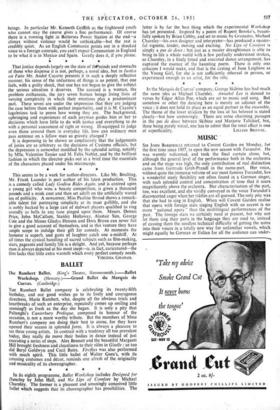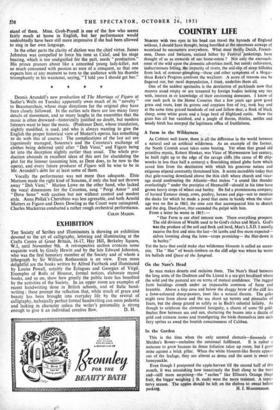MUSIC •
SIR JOHN BARBIROLLI returned to Covent Garden on Monday, for the first time since 1937, to open the new season with Turandot. He was warmly welcomed, and took the final curtain alone, but, although the general level of the performance both in the orchestra and on the stage was high, the only contribution of real distinction came from Gertrude Grob-Prandl in the name-part. Her voice, withOtit quite the immense volume of our most famous Turandot, has a wonderful steely flexibility not often found in a German singer, with such splendid control and concentration of tone that it soars magnificently above the orchestra. Her characterisation of the part, too, was excellent, and she vividly conveyed in the voice Turandot's disconcerted anger when her riddles are all guessed. The only pity was that she had to sing in English. When will Covent Garden realise that opera with foreign stars singing English with an accent is no more " national opera " than the multilingual performances of the past. The foreign stars we certainly need at present, but why not let them sing their parts in the language they are used to, instead of causing them the needless technical difficulty of getting the notes into their voices in a totally new Way for unfamiliar vowels, which might equally be German or Italian for all the audience can under- stand of them. Mme. Grob-Prandl is one of the few who seems fairly much at home in English, but her performance would undoubtedly have been still more impressive if she had been allowed to sing in her own language.
In the other parts the clarity of diction was the chief virtue. Jaines Johnston was compelled to force his tone as Calaf, and his stage bearing, which is too undignified for the part, needs " production." His prince prances about like a conceited young lady-klllef, not so much consumed with passion as sure of a conquest, so that one expects him at any moment to turn to the andience with his thumbs triumphantly in his waistcoat, saying, " I told you I should get her:" Dennis Arundell's new. production of The Marriage of Figaro at Sadler's Wells on Tuesday apparently owes much of its " novelty " to Beaumarchais, whose stage directions for the original play have been closely followed. In the earlier. acts there are too many fussy details of movement, and so many laughs in the ensembles that the music is often drowned—historidally justified no doubt, but modern listeners want to hear the music. (Professor Dent, whose translation, slightly modified, is used, and who is always wanting to give the English the proper historical view of Mozart's operas, has something to do with this of course.) The complications of the last act are ingeniously managed, Susanna's and the Countess's exchange of clothes being deferred until after "Deh Vieni," and Figaro being let into the deception slightly earlier than usual. The whole pro- duction abounds in excellent ideas of this sort for elucidating the plot for the listener (assuming him, as Dent does, to be new to the opera), and every future producer of Figaro will be wise to be in Mr. Arundell's debt for at least some of them.
Vocally the performance was not more than adequate. Elsie Morison made the right kind of Susanna, if only she had not thrown away "Deh Vieni." Marion Lowe on the other hand, who lacked the vocal dimensions for _the Countess, sang " Porgi Amor" and " Dove -Sono" with caution but not without control and modest style. Anna Pollak's Cherubino was less agreeable, and both Arnold Matters as Figaro and Denis Dowling as the Count were uninspired. Charles Mackerras conducted a rather rough orchestral performance.
COLIN MASON.



































 Previous page
Previous page